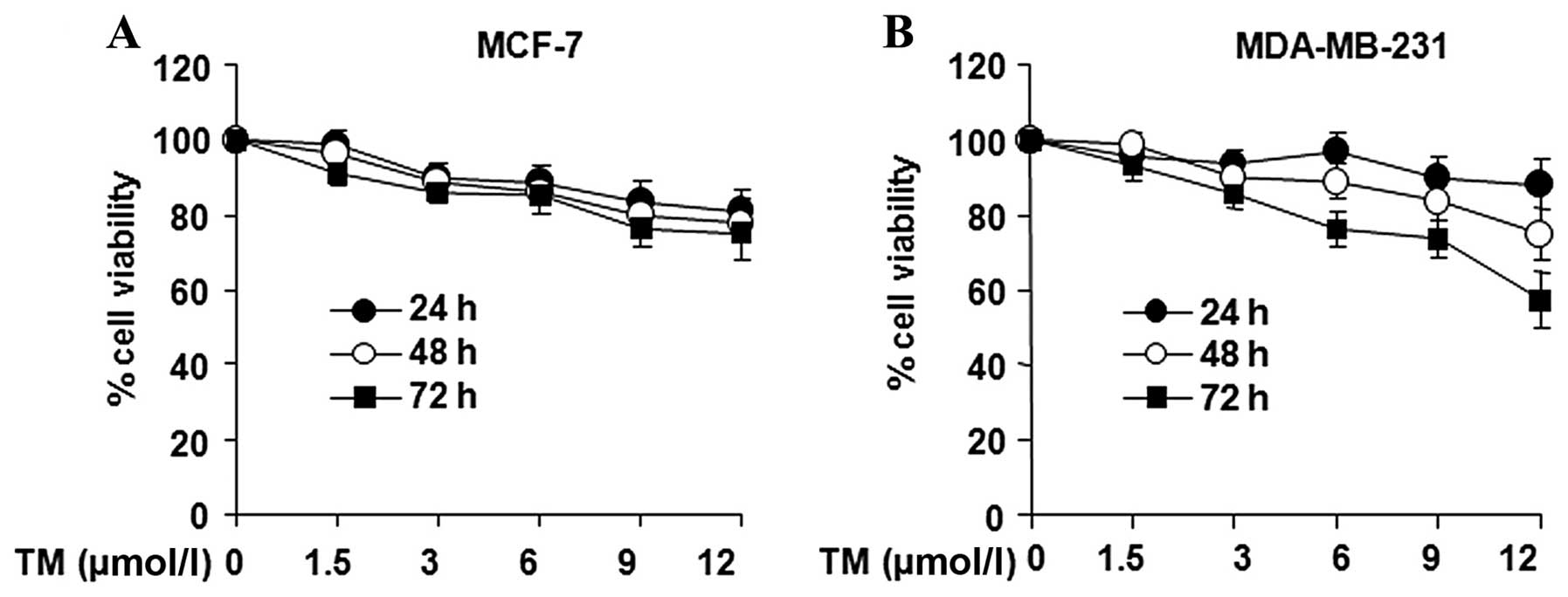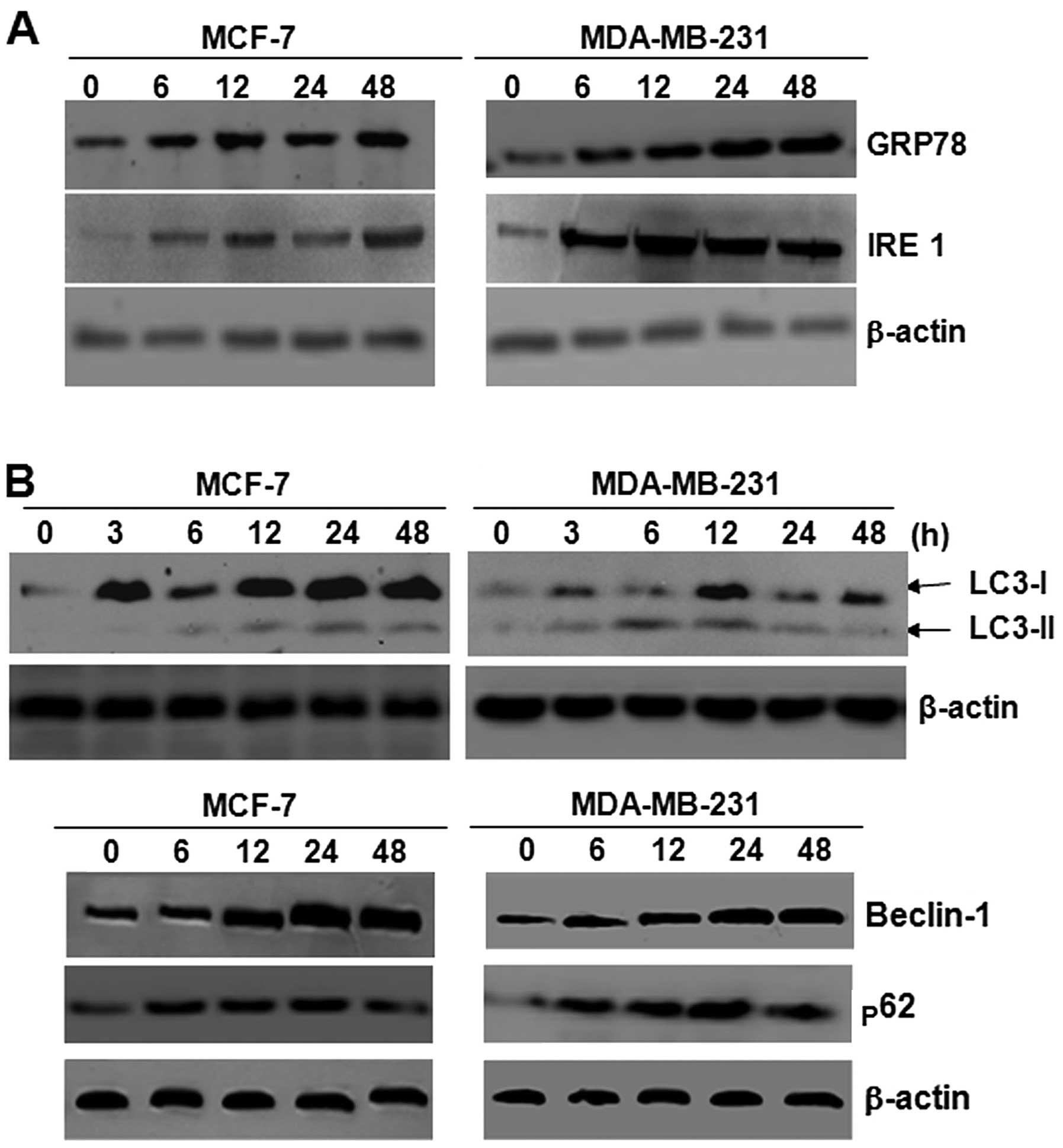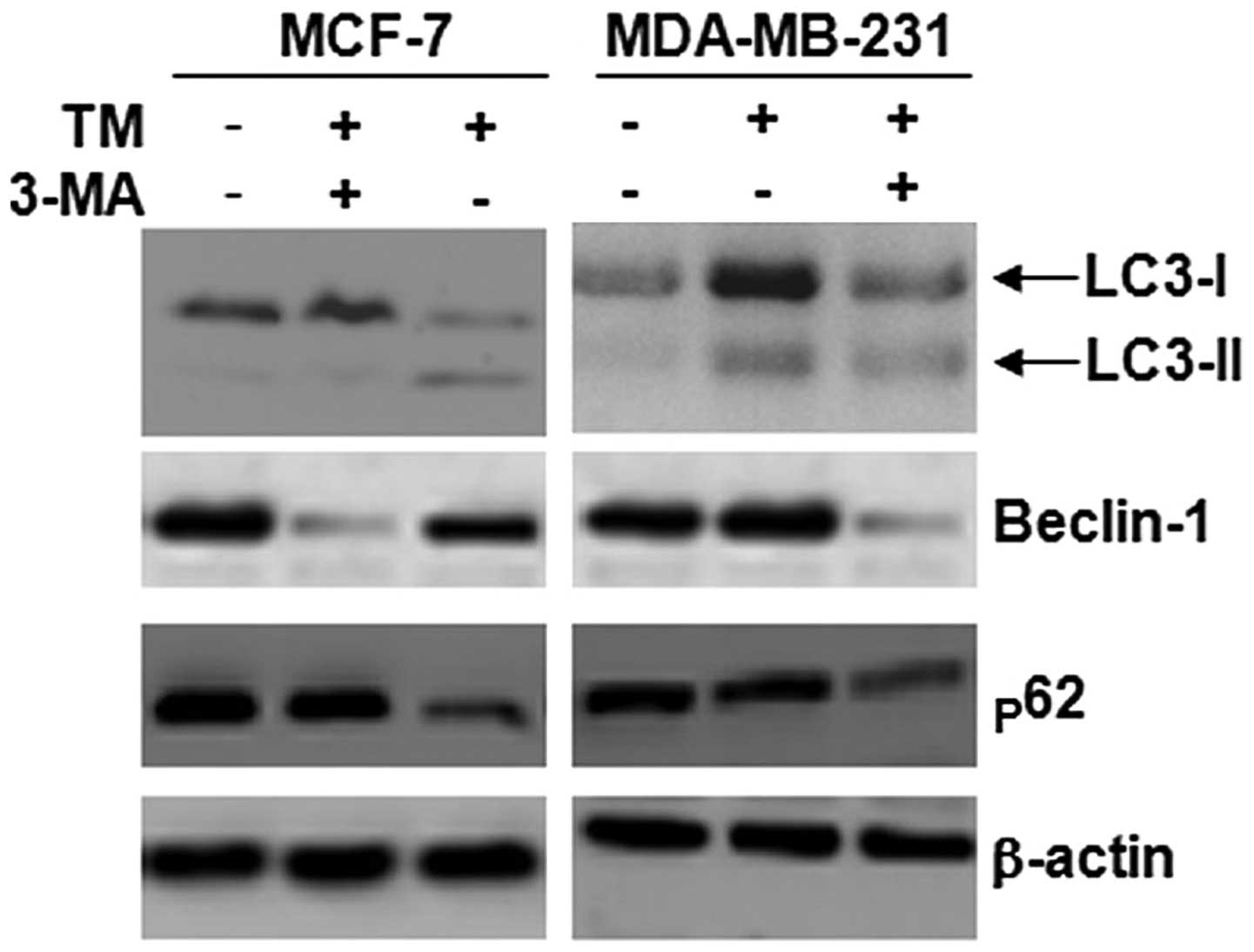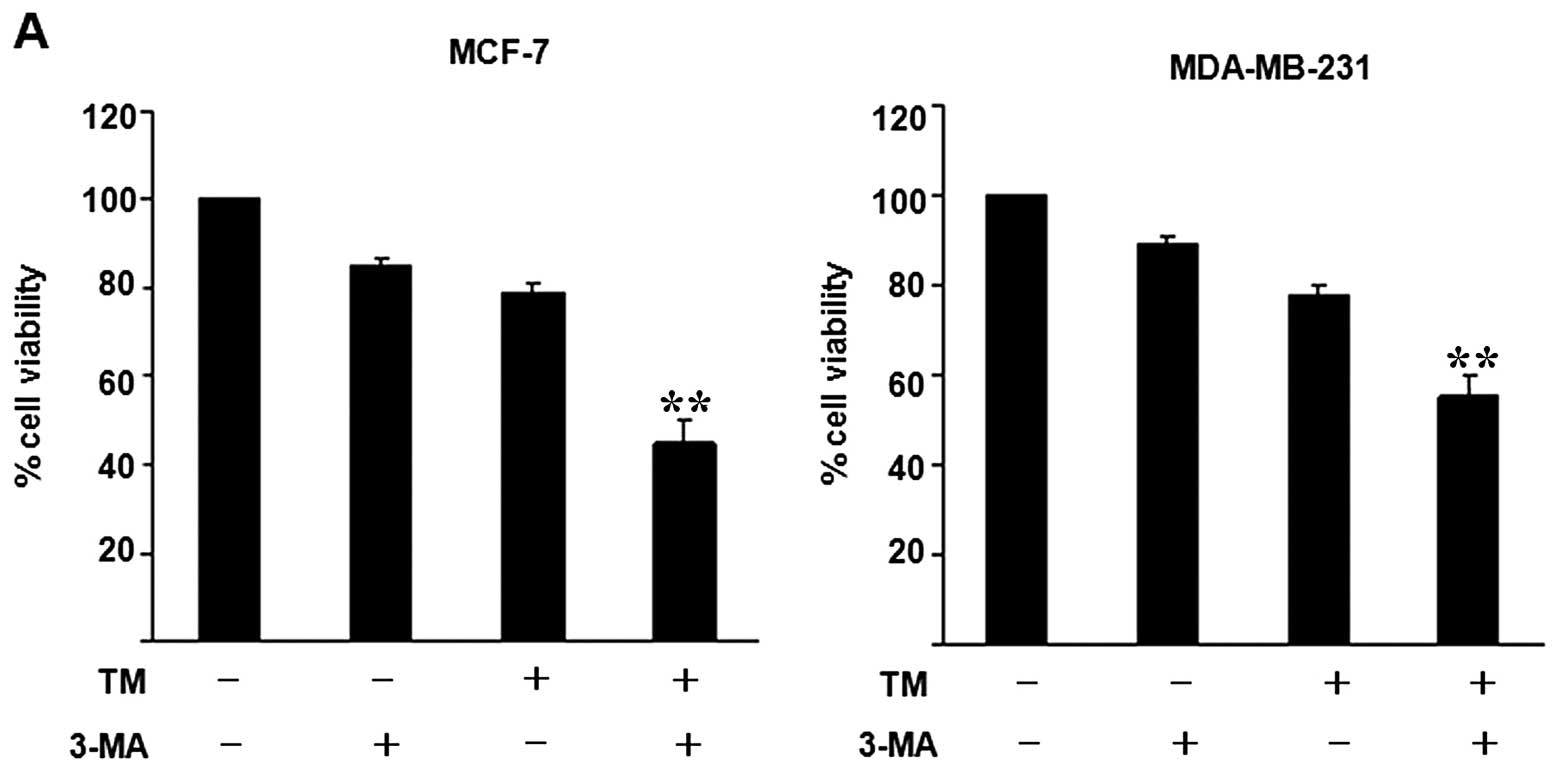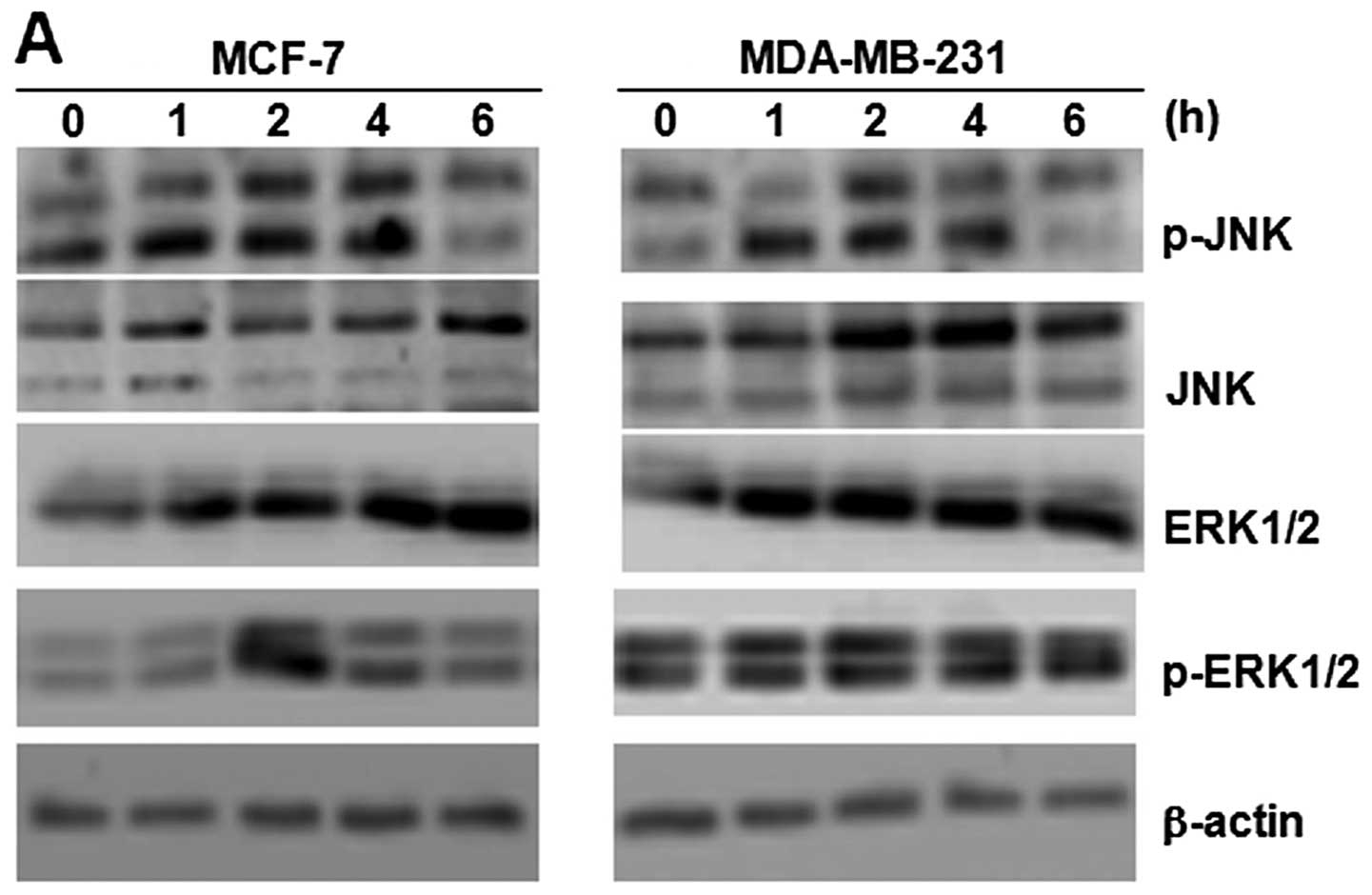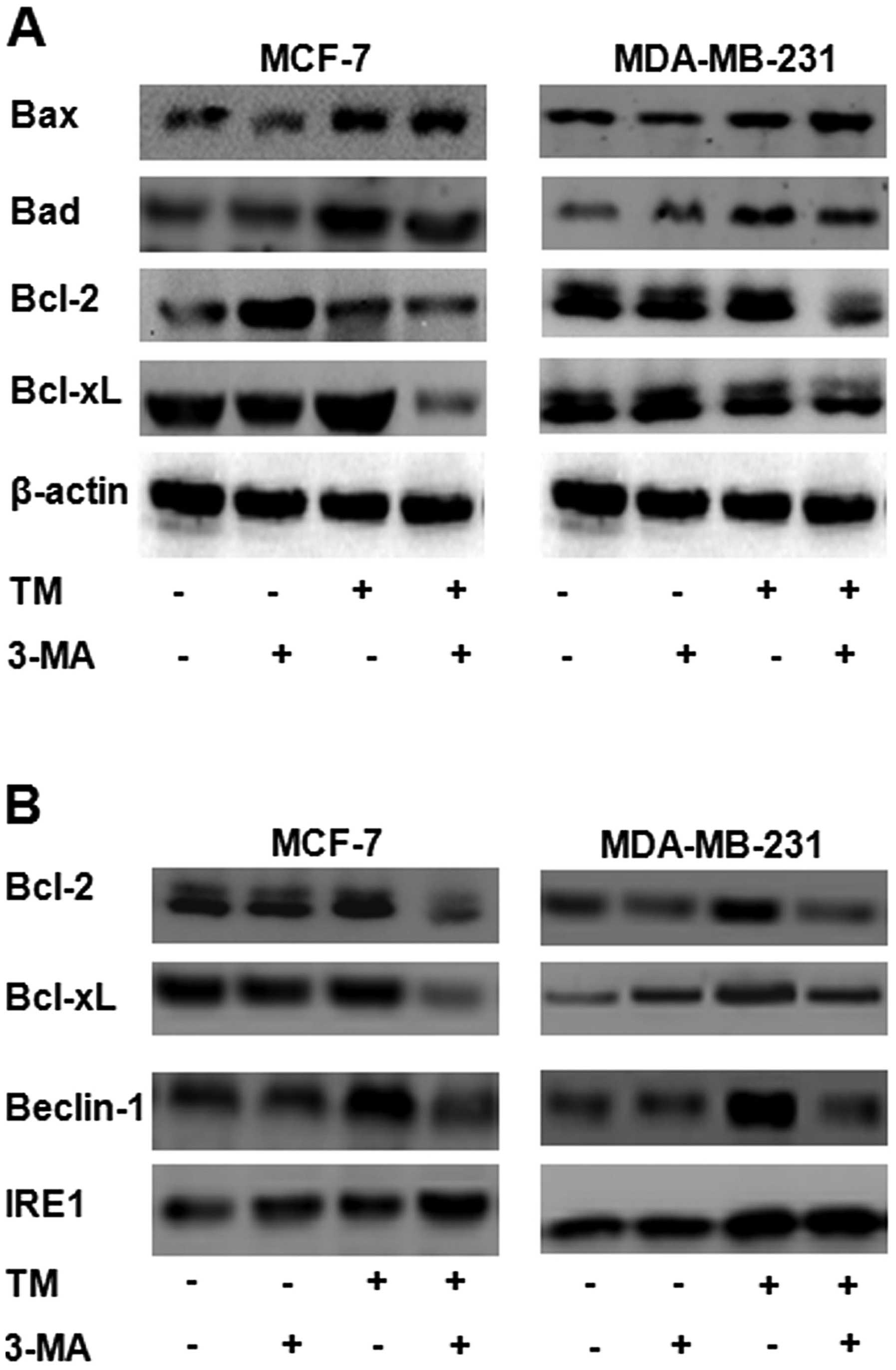|
1
|
Mann MJ and Hendershot LM: UPR activation
alters chemosensitivity of tumor cells. Cancer Biol Ther.
5:736–740. 2006. View Article : Google Scholar : PubMed/NCBI
|
|
2
|
Carrara M, Prischi F and Ali MM: UPR
signal activation by luminal sensor domains. Int J Mol Sci.
14:6454–6466. 2013. View Article : Google Scholar : PubMed/NCBI
|
|
3
|
Price J, Zaidi AK, Bohensky J, et al:
Akt-1 mediates survival of chondrocytes from endoplasmic
reticulum-induced stress. J Cell Physiol. 222:502–508.
2010.PubMed/NCBI
|
|
4
|
Xi H, Kurtoglu M, Liu H, et al:
2-Deoxy-D-glucose activates autophagy via endoplasmic reticulum
stress rather than ATP depletion. Cancer Chemother Pharmacol.
67:899–910. 2011. View Article : Google Scholar : PubMed/NCBI
|
|
5
|
Ding WX, Ni HM, Gao W, et al: Differential
effects of endoplasmic reticulum stress-induced autophagy on cell
survival. J Biol Chem. 282:4702–4710. 2007. View Article : Google Scholar : PubMed/NCBI
|
|
6
|
Yorimitsu T and Klionsky DJ: Endoplasmic
reticulum stress: a new pathway to induce autophagy. Autophagy.
3:160–162. 2007. View Article : Google Scholar
|
|
7
|
Wang WB, Feng LX, Yue QX, et al:
Paraptosis accompanied by autophagy and apoptosis was induced by
celastrol, a natural compound with influence on proteasome, ER
stress and Hsp90. J Cell Physiol. 227:2196–2206. 2012. View Article : Google Scholar : PubMed/NCBI
|
|
8
|
Jin S and White E: Role of autophagy in
cancer: management of metabolic stress. Autophagy. 3:28–31. 2007.
View Article : Google Scholar : PubMed/NCBI
|
|
9
|
Marcilla-Etxenike A, Martin ML,
Noguera-Salva MA, et al: 2-Hydroxyoleic acid induces ER stress and
autophagy in various human glioma cell lines. PLoS One.
7:e482352012. View Article : Google Scholar : PubMed/NCBI
|
|
10
|
Helgason GV, Holyoake TL and Ryan KM: Role
of autophagy in cancer prevention, development and therapy. Essays
Biochem. 55:133–151. 2013. View Article : Google Scholar : PubMed/NCBI
|
|
11
|
Li J, Hou N, Faried A, et al: Inhibition
of autophagy by 3-MA enhances the effect of 5-FU-induced apoptosis
in colon cancer cells. Ann Surg Oncol. 16:761–771. 2009. View Article : Google Scholar : PubMed/NCBI
|
|
12
|
Klionsky DJ: The molecular machinery of
autophagy: unanswered questions. J Cell Sci. 118:7–18. 2005.
View Article : Google Scholar : PubMed/NCBI
|
|
13
|
Topisirovic I and Sonenberg N: Cell
biology. Burn out or fade away? Science. 327:1210–1211. 2010.
View Article : Google Scholar : PubMed/NCBI
|
|
14
|
Kang R, Zeh HJ, Lotze MT and Tang D: The
Beclin 1 network regulates autophagy and apoptosis. Cell Death
Differ. 18:571–580. 2011. View Article : Google Scholar : PubMed/NCBI
|
|
15
|
Pattingre S, Tassa A, Qu X, et al: Bcl-2
antiapoptotic proteins inhibit Beclin 1-dependent autophagy. Cell.
122:927–939. 2005. View Article : Google Scholar : PubMed/NCBI
|
|
16
|
Hetz C, Bernasconi P, Fisher J, et al:
Proapoptotic BAX and BAK modulate the unfolded protein response by
a direct interaction with IRE1alpha. Science. 312:572–576. 2006.
View Article : Google Scholar : PubMed/NCBI
|
|
17
|
Klee M, Pallauf K, Alcala S, et al:
Mitochondrial apoptosis induced by BH3-only molecules in the
exclusive presence of endoplasmic reticular Bak. EMBO J.
28:1757–1768. 2009. View Article : Google Scholar : PubMed/NCBI
|
|
18
|
Coutinho-Camillo CM, Lourenço SV,
Nishimoto IN, et al: Expression of Bcl-2 family proteins and
association with clinicopathological characteristics of oral
squamous cell carcinoma. Histopathology. 57:304–316. 2010.
View Article : Google Scholar : PubMed/NCBI
|
|
19
|
Miloso M, Lourenco SV, Nishimoto IN, et
al: MAPKs as mediators of cell fate determination: an approach to
neurodegenerative diseases. Curr Med Chem. 15:538–548. 2008.
View Article : Google Scholar : PubMed/NCBI
|
|
20
|
Vacotto M, Coso O and Fiszer de Plazas S:
Programmed cell death and differential JNK, p38 and ERK response in
a prenatal acute hypoxic hypoxia model. Neurochem Int. 52:857–863.
2008. View Article : Google Scholar : PubMed/NCBI
|
|
21
|
Qing Y, Liang Y, Du Q, et al: Apoptosis
induced by trimethyltin chloride in human neuroblastoma cells SY5Y
is regulated by a balance and cross-talk between NF-kappaB and
MAPKs signaling pathways. Arch Toxicol. 87:1273–1285. 2013.
View Article : Google Scholar : PubMed/NCBI
|
|
22
|
Liu Z, Zhang YY, Zhang QW, et al:
3-Bromopyruvate induces apoptosis in breast cancer cells by
downregulating Mcl-1 through the PI3K/Akt signaling pathway.
Anticancer Drugs. 25:447–455. 2014. View Article : Google Scholar : PubMed/NCBI
|
|
23
|
Crosti P, Malerba M and Bianchetti R:
Tunicamycin and Brefeldin A induce in plant cells a programmed cell
death showing apoptotic features. Protoplasma. 216:31–38. 2001.
View Article : Google Scholar : PubMed/NCBI
|
|
24
|
Guerrero AD, Welschhans RL, Chen M and
Wang J: Cleavage of anti-apoptotic Bcl-2 family members after TCR
stimulation contributes to the decision between T cell activation
and apoptosis. J Immunol. 190:168–173. 2013. View Article : Google Scholar : PubMed/NCBI
|
|
25
|
Rubinstein AD, Eisenstein M, Ber Y, et al:
The autophagy protein Atg12 associates with antiapoptotic Bcl-2
family members to promote mitochondrial apoptosis. Mol Cell.
44:698–709. 2011. View Article : Google Scholar : PubMed/NCBI
|
|
26
|
Kang SH, Choi EJ, Kim HW, et al:
Complications in endoscopic-assisted open reduction and internal
fixation of mandibular condyle fractures. Oral Surg Oral Med Oral
Pathol Oral Radiol. 113:201–206. 2012. View Article : Google Scholar : PubMed/NCBI
|
|
27
|
Pattingre S, Bauvy C, Carpentier S, et al:
Role of JNK1-dependent Bcl-2 phosphorylation in ceramide-induced
macroautophagy. J Biol Chem. 284:2719–2728. 2009. View Article : Google Scholar : PubMed/NCBI
|
|
28
|
Bartolome AC, Guillen and Benito M:
Autophagy plays a protective role in endoplasmic reticulum
stress-mediated pancreatic beta cell death. Autophagy. 8:1757–1768.
2012. View Article : Google Scholar : PubMed/NCBI
|
|
29
|
Bernales S, Papa FR and Walter P:
Intracellular signaling by the unfolded protein response. Annu Rev
Cell Dev Biol. 22:487–508. 2006. View Article : Google Scholar
|
|
30
|
Ciechomska IA, Gabrusiewicz K,
Szczepankiewicz AA and Kaminska B: cyclosporine a-induced cell
death. Oncogene. 32:1518–1529. 2013.PubMed/NCBI
|
|
31
|
Hoyer-Hansen M, Bastholm L, Szyniarowski
P, et al: Control of macroautophagy by calcium,
calmodulin-dependent kinase kinase-beta, and Bcl-2. Mol Cell.
25:193–205. 2007. View Article : Google Scholar : PubMed/NCBI
|
|
32
|
Verfaillie T, Salazar M, Velasco G and
Agostinis P: Linking ER stress to autophagy: potential implications
for cancer therapy. Int J Cell Biol. 9305092010.
|
|
33
|
Imaizumi K: Endoplasmic reticulum stress
response involved in osteogenesis and chondrogenesis. Clin Calcium.
23:1759–1766. 2013.(In Japanese).
|
|
34
|
Kouroku Y, Fujita E, Tanida I, et al: ER
stress (PERK/eIF2alpha phosphorylation) mediates the
polyglutamine-induced LC3 conversion, an essential step for
autophagy formation. Cell Death Differ. 14:230–239. 2007.
View Article : Google Scholar : PubMed/NCBI
|
|
35
|
Hoyer-Hansen M and Jaattela M: Connecting
endoplasmic reticulum stress to autophagy by unfolded protein
response and calcium. Cell Death Differ. 14:1576–1582. 2007.
View Article : Google Scholar : PubMed/NCBI
|
|
36
|
Zhang J, Morris MW Jr, Dorsett-Martin WA,
et al: Autophagy is involved in endoplasmic reticulum
stress-induced cell death of rat hepatocytes. J Surg Res.
183:929–935. 2013. View Article : Google Scholar : PubMed/NCBI
|
|
37
|
Deegan S, Saveljeva S, Gorman AM and
Samali A: Stress-induced self-cannibalism: on the regulation of
autophagy by endoplasmic reticulum stress. Cell Mol Life Sci.
70:2425–2441. 2013. View Article : Google Scholar : PubMed/NCBI
|
|
38
|
Hu P, Lai D, Lu P, et al: ERK and Akt
signaling pathways are involved in advanced glycation end
product-induced autophagy in rat vascular smooth muscle cells. Int
J Mol Med. 29:613–618. 2012.PubMed/NCBI
|
|
39
|
Lee S, Lee SJ, Coronata AA, et al: Carbon
monoxide confers protection in sepsis by enhancing Beclin
1-dependent autophagy and phagocytosis. Antioxid Redox Signal.
20:432–442. 2013. View Article : Google Scholar : PubMed/NCBI
|
|
40
|
Park KJ, Lee SH, Lee CH, et al:
Upregulation of Beclin-1 expression and phosphorylation of Bcl-2
and p53 are involved in the JNK-mediated autophagic cell death.
Biochem Biophys Res Commun. 382:726–729. 2009. View Article : Google Scholar : PubMed/NCBI
|
|
41
|
Marquez RT and Xu L: Bcl-2: Beclin 1
complex: multiple, mechanisms regulating autophagy/apoptosis toggle
switch. Am J Cancer Res. 2:214–221. 2012.PubMed/NCBI
|
|
42
|
Gao P, Bauvy C, Souquere S, et al: The
Bcl-2 homology domain 3 mimetic gossypol induces both Beclin
1-dependent and Beclin 1-independent cytoprotective autophagy in
cancer cells. J Biol Chem. 285:25570–25581. 2010. View Article : Google Scholar : PubMed/NCBI
|
|
43
|
Wei Y, Sinha S and Levine B: Dual role of
JNK1-mediated phosphorylation of Bcl-2 in autophagy and apoptosis
regulation. Autophagy. 4:949–951. 2008. View Article : Google Scholar : PubMed/NCBI
|
|
44
|
Liu L, Fang YQ, Xue ZF, et al:
Beta-asarone attenuates ischemia-reperfusion-induced autophagy in
rat brains via modulating JNK, p-JNK, Bcl-2 and Beclin 1. Eur J
Pharmacol. 680:34–40. 2012. View Article : Google Scholar
|















